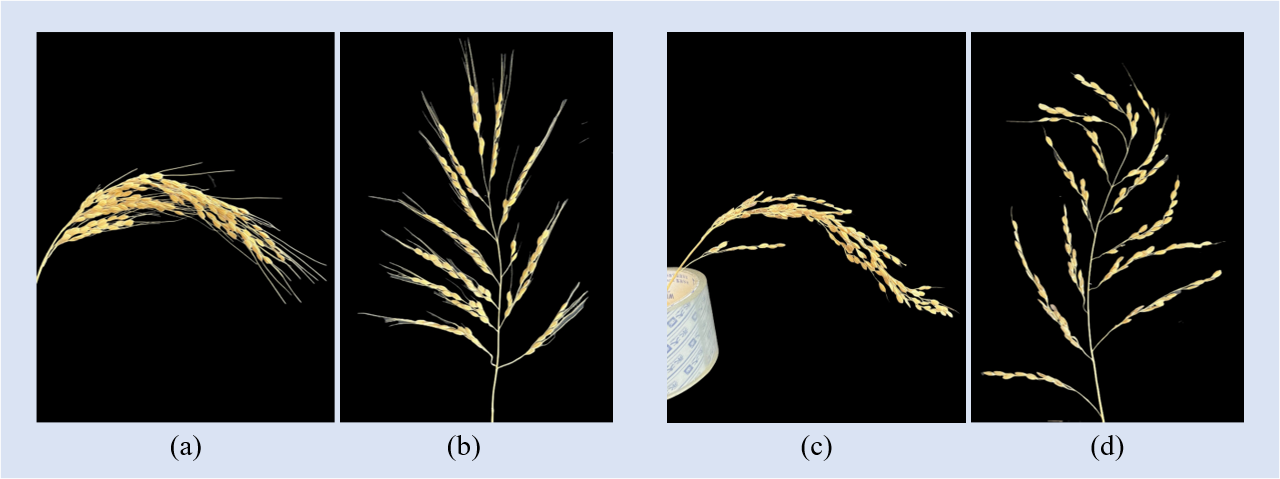 Introduction
Introduction
Multi-cultivar and multi-view rice plant image dataset (CVRP) consists of 2,303 field images of rice plants, captured from 231 landraces and 50 modern cultivars grown under dense planting conditions. Each image is paired with its corresponding annotated mask. Additionally, we provide 123 indoor images focused on individual panicles and 3D plant reconstruction results.
 CVRP Structure
CVRP Structure
CVRP is organized into several directories, each representing different aspects of the rice plants and panicles. The overall structure is as follows:
📁CVRP/
├── 📁FieldImages/
│ ├── 📁field_scenes/
│ │ ├── 📁Annotations/
│ │ │ ├── 00004.png
│ │ │ ├── ...
│ │ └── 📁Images/
│ │ ├── 00004.jpg
│ │ ├── ...
│ └── 📁multi_cultivars/
│ ├── 📁T1/
│ │ ├── 📁Annotations/
│ │ │ ├── T1_1.jpg
│ │ │ ├── ...
│ │ └── 📁Images/
│ │ ├── T1_1.jpg
│ │ ├── ...
│ └── ...
├── 📁IndoorPanicleImages/
│ ├── T6_1.png
│ ├── T6_2.png
│ ├── T6_3.png
│ ├── ...
├── 📁TargetReconstruction
│ ├── G1204.ply
│ ├── G1210.ply
└── └── G1224.ply
 CVRP Statistics
CVRP Statistics
Detailed statistics of the CVRP dataset look like:
| Category | Field Data (Multiple Cultivars) | Field Data (Field Scenes) | Indoor Data | Total |
|---|---|---|---|---|
| Images | 2203 | 100 | 123 | 2426 |
| Annotations | 2203 | 100 | -- | 2303 |
 CVRP Overview
CVRP Overview
Multiple Cultivars and Multiple Viewpoints
There are 8 landraces used in the study with distinctive characteristics of panicles. The landraces are: (a) Shuiniupi, (b) Luganbai, (c) Jinzhongjing, (d) Gankeqing, (e) Liushizijing, (f) Xiangfandao, (g) Hongkenuo, and (h) Hahaxiao.

Images of rice plants with panicles in the field from four distinct viewpoints: nadir view, oblique view, side view and close-up view.

Rice panicles in paddy fields. Plants are in two distinct growth stages. (a), (b), (c) and (d) are at the flowering stage, while (e), (f), (g) and (h) are at the ripening stage.

Annotation Workflow
A semi-automatic annotation method using deep learning models was developed for annotations, which were then subjected to strict manual curation.

Annotation Results
Field images and corresponding annotations. (a), (b), (c), (d) are four views of a single landrace and detailed annotations. (e), (f), (g), (h) show field scenes containing multiple panicles, accompanied by their respective annotations, which capture the complexity of these cluttered environments.

Individual Panicles
We captured images of individual panicles at Nanjing Agricultural University's lab: one set in their natural state with a homemade base, preserving pose and structure; the other in a manually unfolded state to reveal hidden grains and internal structures. Examples are Jinzhongjing and Hahaxiao in both natural and unfolded states.

Plant Reconstruction
3D reconstruction of plants. (a), (b), and (c) show the reconstruction results for the three cultivars. In each pair of images, the left image shows the plant reconstruction without annotation or segmentation, and the right image shows the plant reconstruction with the annotated panicles highlighted in bright yellow.

 Acknowledgements
Acknowledgements
We thank Professor Jianmin Wan for valuable suggestions and Mr. Zhitao Zhu, Mr. Yu Wang, Dr. Weijie Tang, and Dr. Yunhui Zhang for their technical support.
 Citation
Citation
@article{TANG2025100025,
title = {CVRP: A rice image dataset with high-quality annotations for image segmentation and plant phenomics research},
journal = {Plant Phenomics},
volume = {7},
number = {1},
pages = {100025},
year = {2025},
issn = {2643-6515},
doi = {https://doi.org/10.1016/j.plaphe.2025.100025},
url = {https://www.sciencedirect.com/science/article/pii/S2643651525000317},
author = {Zhiyan Tang and Jiandong Sun and Yunlu Tian and Jiexiong Xu and Weikun Zhao and Gang Jiang and Jiaqi Deng and Xiangchao Gan}
}